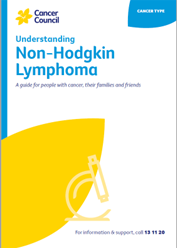- Home
- Non-Hodgkin lymphoma
- Treatment
- Late effects of treatment
Late effects of treatment for non-Hodgkin lymphoma
Some side effects from treatment may not show up until many months or years later. These are called late effects. Your treatment will be carefully planned to reduce the risk of any of these late effects.
Learn more about:
Overview
With improved staging and treatment of non-Hodgkin lymphoma, late effects are less likely than in the past. Your doctor will talk to you about any possible late effects before treatment starts.
When treatment finishes, talk to your doctors about your risk of developing late effects from treatment and how this will be monitored. Ask for a written summary of your treatments so you have this on hand if needed.
It is important that you talk to your doctors about any symptoms that appear, even many years after treatment.
Second cancers
Occasionally, many years after successful treatment for non-Hodgkin lymphoma, some people develop a new, unrelated cancer. This may be either a new form of lymphoma or leukaemia, or a type of solid cancer.
Sometimes a second cancer happens because of being diagnosed at a young age with lymphoma, being treated with certain chemotherapy drugs, or having inherited a genetic risk. In some cases, radiation therapy can also increase the risk of developing a second cancer near the area treated.
Heart problems
Some forms of drug treatments may damage the heart muscle so it doesn’t work as well. If this is a concern for you, your doctor will monitor your heart function before and during treatment to limit your risk of developing this condition. They will adjust your chemotherapy dose or try a different drug if heart changes are seen. Radiation therapy to the chest area may also lead to heart disease.
Let your doctor know if you notice pain or tightness in the chest or feel your heart is beating too fast or too slowly.
Thyroid problems
Radiation therapy to the neck area may cause an underactive thyroid, and you may need daily thyroid hormone replacement pills.
→ READ MORE: Stem cell transplant for non-Hodgkin lymphoma
Podcast for people affected by cancer
Listen now
Dr Puja Bhattacharyya, Haematology Staff Specialist, Western Sydney Local Health District, Blacktown Hospital; A/Prof Christina Brown, Haematologist, Royal Prince Alfred Hospital and The University of Sydney; Dr Susan Carroll, Senior Staff Specialist, Radiation Oncology, Royal North Shore Hospital and The University of Sydney; Jo Cryer, Clinical Nurse Consultant, Haematology, St George Hospital; Marie Marr, Consumer; Katelin Mayer, Clinical Nurse Consultant, Cancer Outreach Team, Nelune Comprehensive Cancer Centre, Sydney; Vanessa Saunders, 13 11 20 Consultant, Cancer Council NSW; Elise Toyer, Haematology Clinical Nurse Consultant, Blacktown Hospital.
View the Cancer Council NSW editorial policy.
View all publications or call 13 11 20 for free printed copies.
